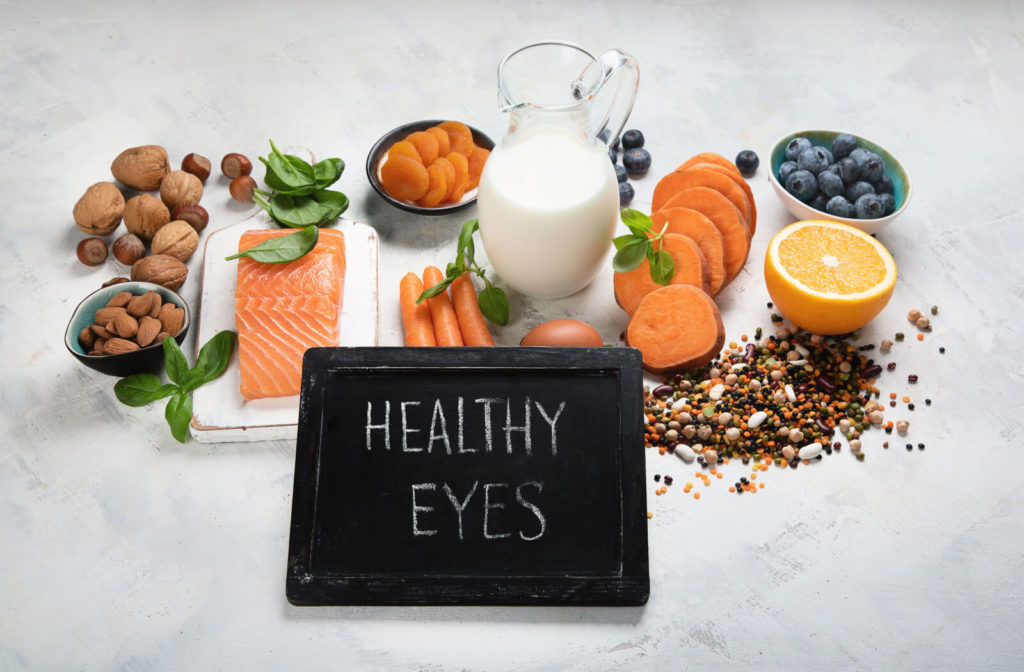Eye care doesn’t start and end at the optometrist’s office. Managing your eye health is an everyday process, and instilling good habits may help you avoid certain eye conditions and minimize symptoms.
Taking care of your eyes doesn’t take drastic changes or commitments, and the results can significantly benefit you.
#1: Eat a Balanced Diet
The foods you eat influence your overall health, and some specific food types hold nutrients your eyes need, including:
- Leafy greens, like spinach, collard greens, and kale
- Omega-3 fatty acids found in salmon, halibut, and tuna
- Citrus fruits and juice
- Proteins from eggs, nuts, or beans
- Sweet potatoes
- Squash
- Brussel sprouts and broccoli
A varied diet full of fruits and vegetables gives you the best opportunity to eat a range of vitamins and minerals that benefit your eyes. Omega-3 fatty acids, zinc, lutein, and vitamins C and E can help delay age-related vision problems, such as macular degeneration and cataracts.
Eating a balanced diet can help manage weight and reduce the possibility of obesity. Carrying excess weight can increase the risk of developing type 2 diabetes. High blood sugar, cholesterol, and blood pressure may make you more likely to develop vision loss from diabetic retinopathy or increase your chances of experiencing glaucoma.
Another way to control blood pressure and high cholesterol is through regular exercise. By managing your health through exercise, you can reduce the risk of developing diabetes and related medical problems.
#2: Protect Your Eyes from the Elements
Sunglasses aren’t only a fashionable accessory. Sunglasses can also help protect your eyes from harmful UV-A and UV-B radiation and block 99% to 100% of the sun’s harmful rays. Sun damage to your eye can quicken the progression of age-related macular degeneration and cataracts, so whenever you’re outside or in the car, wearing a pair of sunglasses can make you look better and see better.
Protective eyewear can help prevent eye injuries, whether you’re an athlete or working on home improvements. Safety goggles, protective eyeglasses, or guards are specifically designed for whatever activity you choose.
Designed to be shatter-proof and absorb impact, protective eyewear can help you avoid trauma and injuries from accidents by shielding your eyes and maintaining your vision.

#3: Take a Break from Your Screens
Phones, tablets, and computer screens are a necessary part of life, but too much screen time with few breaks can cause problems, including:
- Digital eye strain
- Blurred vision
- Difficulty focusing at a distance
- Headaches
- Dry eyes
Stepping away from your screens throughout the day to rest your eyes can help relieve eye strain, headaches, and dry eyes. Some optometrists recommend using the 20-20-20 rule: every 20 minutes, you shift your eyes to something 20 feet away for at least 20 seconds.
If your computer use causes frequent dry eye, artificial tears can help restore lubrication as you stare at your screen.
#4: Manage Existing Health Conditions
Chronic illnesses may increase your risk of developing certain eye conditions. Some chronic conditions that can affect the eye include:
- Lyme disease
- Autoimmune conditions such as rheumatoid arthritis, multiple sclerosis, and lupus
- Liver disease
Some pre-existing health problems can cause ocular problems, from dry eye and redness to loss of visual acuity. While some medical conditions can’t be cured, management through lifestyle choices and diet can reduce symptoms that affect the eyes.
Even temporary conditions, such as pregnancy, can change the clarity of your eyesight. Blurred or hazy vision can result from hormone changes in the body. Limiting screen time, working in well-lit spaces, and resting your eyes can help your mind adjust to the temporary change in vision.
#5: Learn Your Family Health History
Knowing your family medical history and any eye diseases that may be passed down from family members allows you to uncover your eye health risks and identify symptoms of severe eye conditions early.
Family history can be a risk factor in the development of a few eye conditions, including,
- Glaucoma
- Cataracts
- Refractive errors, such as nearsightedness, farsightedness, and astigmatism
- Macular degeneration
A family history doesn’t mean you’re guaranteed to develop the same condition. Other risk factors can determine your likelihood of developing an eye disease. But having a sense of the common signs of ocular decline in your direct family members can help you and your optometrist detect the symptoms as early as possible.
Maintain a Regular Eye Exam Schedule
Eye exams are vital to keeping your eyes healthy. If you need advice on how to take care of your eyes between your annual eye exams, our experienced team can help you prioritize the needs of your unique eyes.
Schedule an appointment to have your eyes tested and find the newest trends in frames and sunglasses at Dr. Henslick Vision Center.



